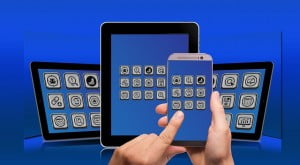 Summary: Many businesses ask the wrong questions about mobile apps. They approach mobility from the wrong angle. Learn which questions you should (and shouldn’t) be asking about mobile, and what it means to your business.
Summary: Many businesses ask the wrong questions about mobile apps. They approach mobility from the wrong angle. Learn which questions you should (and shouldn’t) be asking about mobile, and what it means to your business.
The business mobility conversation too often centers around technology.

Should we choose Native apps or HTML5?
Which platform is best?
Should we build for Android or iOS?
These questions bypass the most important mobile question:
How will mobility improve our business processes? How can mobile transform the way we operate?
When you approach mobility from this perspective, the conversation changes. Mobile apps become a means to an end, rather than the end goal. They become the delivery vehicle for business process improvement.
So, how can mobility improve your business processes? Here are a few ways:
Increase speed of data delivery
At their most basic level, smartphones bring your business data to your fingertips. They connect your data to the employees who need it most.
For instance, what happens when salespeople need to check inventory levels while at a customer site? Before mobile, this task required a phone call back to the office. Now, they can access that data instantly from their smartphone. In the age of mobile, this real-time data access becomes a necessity.
“To stay competitive, business must occur in real time,” says says Alex Bratton, author of Billion Dollar Apps: How to Find and Implement a Winning Mobile Strategy. “What happens when you don’t have the information you need at the exact moment you need it? Managers should know where service specialists (truck drivers, repairers, auditors, salespeople, etc.) are so they can make decisions on the fly. Service specialists should be able to open an immediate line of communication to support teams, including call centers, financial specialists, and account managers. Support teams should be able to report closed issues to managers.”
Uncover efficiency improvements

The extra data provided by mobile devices (and wearables) holds amazing potential for your business processes.
For instance, GPS sensors in smartphones let you track your product deliveries, service calls, and more–all in real-time. As explained below, this data opens the door for dramatic efficiency improvements.
“Mobile allows for more efficient and accurate business processes,” says Wendell Adams, CEO of AB Mobile Apps. “For example, we have been working with a garbage company on how to integrate wearables and apps. In this case the wearable would be monitoring an individual and allow the company to know things like; does one house take longer than others? Is there more strain on the driver at certain customer’s homes because of having to lift more weight? How much are people getting in and out of a truck and how long does each stop take? These processes become more efficient with less risk to the workers as these questions are answered.”
Eliminate duplicate data entry
How much time do your employees spend completing paperwork, and then entering that data into your system? Not only does this process waste time, it opens the door for data entry errors. Giving employees the ability to directly enter data into your system via mobile devices will save time, and eliminate these risks.
“We used to have our techs in the field use pads of paper that they would then draw a schematic of the home and the damage done to it onto,” says Alexander Ruggie, Public Relations Director at 911 Restoration. “Today, they simply pull out their smart phone or tablet and create a schematic on the site. When combined with laser tape measures and an insurance adjusters notes application, a technician can provide a homeowner with an estimate for the damage on site without ever leaving the property. This combination of mobility and tools also gives homeowners a greater peace of mind that our techs are true professionals than they would receive from our competitors who still use a pad of paper.”
Improve customer interaction

With the rise of mobile, 24/7 is getting longer. What does that mean?
Let me explain. Before mobile, your website provided 24/7 access to your business. But, was it truly “24/7?” Not really.
To interact with your business online, your customers needed access to a PC. How many hours a day are your customers sitting at a PC? Maybe 8 or 9 on the high end.
Mobile changes that. It makes your business truly 24/7. Unlike a PC, your customers always carry their smartphone. With a mobile presence, your customers can truly interact with your business at any time.
“Another common indicator for businesses where mobility makes sense is the need to gather feedback or obtain a certain action from a customer quickly,” says Brett Truka, co-founder at Devetry. “With all of the distractions that the average individual faces on a daily basis, sending a notification to a customer where action needs to be taken and a mobile device can be used will increase the likelihood that you’ll succeed in obtaining the result you desire. If the customer can knock the task off their list and give you that information via their mobile device, as opposed to logging on later when they have a thousand other things going on, chances are that your notification is much more effective.”
Replace single-use hardware
The smartphone has already eliminated many single-use devices in the consumer world.
Did you ever own a GPS device? A point-and-shoot camera? An mp3 player? An alarm clock? A single smartphone replaces all of those devices, and many more.
Now, smartphones are taking aim at single-use business devices.
I’ve seen smartphones replace credit card processing devices, inventory scanners, and more. What single-use hardware can smartphones replace in your industry?
“An awkward period in technology development once led to “luggables”—portable computers that were much larger and more cumbersome than today’s laptop,” says Bratton. “Today, many of us would consider bulky devices created expressly for only one or two purposes as a luggable, including bar code scanners, RFID readers and cash registers, as obsolete. A new breed of mobile connected devices is emerging that takes advantage of our mobile devices for their brains and their user interfaces. The user still interacts with the phone but takes advantage of the capabilities of printers, bar code scanners, medical devices, or other specialized sensors. These connected devices, paired with phones or tablets, will replace the specialized, single-use hardware of the past and provide much broader functionality.”
So, what do you think? Is there anything you would add to this list? If so, please share your thoughts in the comments.
It sounds very interesting!
i like the post very much keep it up
Yah this blog is making a dfference. I love it.
Nice post and Your website is very cool. Well thanks for the article. This article has provided me with an insight about mobile app development. Thank you for sharing such a good article.